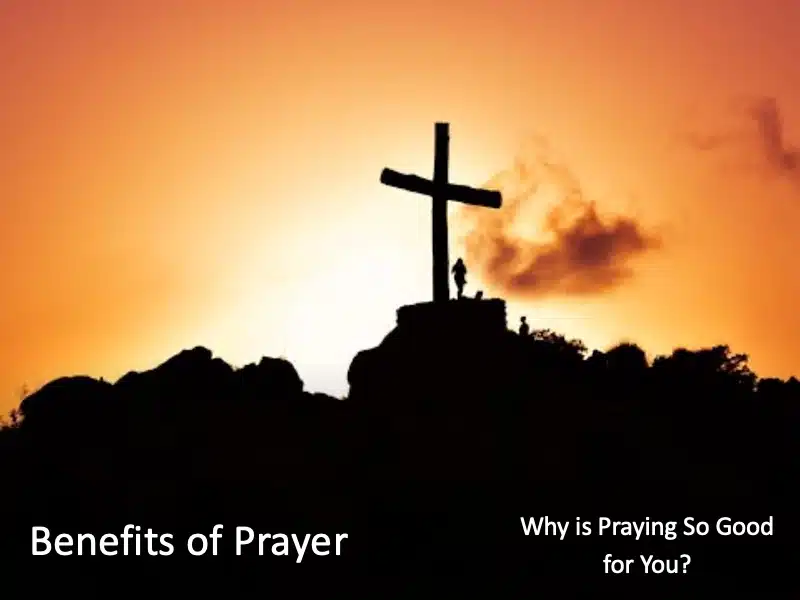Benefits of Prayer – Why is Praying So Good for You?
Prayer is a powerful practice that transcends personal requests, serving as a way to connect with God, find peace, and improve both mental and physical well-being.
It is more than just speaking words—it is an intimate conversation with the Creator, a moment of surrender that allows us to align with His divine plan.
Throughout my life, I have witnessed firsthand how prayer has shaped my journey, providing strength, resilience, and clarity in times of uncertainty.
Rooted in Christian faith, prayer is a direct line to God, offering guidance, comfort, and strength in all circumstances.
From a young age, I faced challenges that could have easily held me back.
I was born with exercise-induced asthma and Tourette syndrome, conditions that many would see as obstacles to pursuing a career in professional sports.
Add to that the countless injuries and setbacks I endured—from broken bones to torn ligaments—and the path to success seemed nearly impossible.
But through prayer, I found the strength to persevere.
Every time I faced adversity, I turned to God, seeking His wisdom and peace.
He didn’t just help me survive—He allowed me to thrive, leading me to a professional basketball career that has spanned over a decade.
Jesus Christ, the Son of God, demonstrated the importance of prayer throughout His life, and through Him, we can find true peace.
In my most difficult moments—whether battling injuries, struggling with self-doubt, or making tough career decisions—I placed my trust in God’s plan.
Prayer became my refuge, a source of unshakable strength that kept me moving forward.
When the world told me to quit, God told me to keep going. When I didn’t know my next step, He illuminated the path.
Scientific research also supports the numerous health benefits of prayer, highlighting its impact as a natural remedy for stress, mental clarity, and overall well-being (Koenig, 2012).
But beyond science, my own experiences are proof that prayer is transformative.
It has given me peace in the storm, resilience in the face of hardship, and a sense of purpose far greater than my own ambitions.
Whether in sports, business, or everyday life, prayer remains one of the most powerful tools we have to navigate life’s challenges and stay connected to God’s greater plan.
A Review of the Physical & Mental Health Benefits of Prayer

Prayer is not only a spiritual practice but also a powerful tool for improving overall health. Research has shown that regular prayer can reduce both chronic and acute stress, enhance emotional resilience, and even contribute to physical healing.
By surrendering worries to God, believers experience a sense of peace that positively impacts both mental and physical well-being.
From lowering blood pressure to improving mood and cognitive function, prayer offers profound benefits that support a healthier, more balanced life.
Prayer Strengthens Your Relationship with God
Christian prayer is more than just asking for help—it is a conversation with the one true God. Through prayer, believers cultivate a deeper relationship with God, trusting in His divine plan.
By following Jesus’ example, you can experience spiritual growth, inner peace, and clarity in your decisions (Pargament, 2011).
Prayer Provides Mental and Emotional Relief
Praying allows individuals to surrender their burdens to God, relieving stress and anxiety.
Research has shown that prayer reduces symptoms of depression and anxiety by fostering a sense of hope and control over one’s circumstances.
A study published in the Journal of Religion and Health found that different types of prayer can have varying effects on mental health, with prayers of gratitude and praise leading to lower anxiety and greater emotional resilience (Upenieks, 2022).
Prayer Improves Physical Health
Scientific studies have linked prayer to physical health benefits, including lower blood pressure, improved heart health, and enhanced immune function.
Prayer has been found to aid in pain management and recovery from illness.
For example, a study of breast cancer survivors revealed that those who prayed regularly experienced a greater sense of well-being and purpose compared to those who did not (Levine et al., 2009).
Prayer Enhances Cognitive Function
Praying encourages mindfulness, focus, and cognitive clarity.
Research published in Religion, Brain & Behavior suggests that prayer can improve attention span and cognitive function, allowing individuals to navigate life’s challenges with greater wisdom and discernment.
By directing thoughts toward God, prayer frees the mind from worry and enhances problem-solving abilities (Adams et al., 2016).
Prayer Helps Develop a Sense of Community
Group prayer strengthens social bonds and provides emotional support.
Attending church services, Bible study groups, or prayer meetings fosters a sense of belonging and encourages individuals to lean on one another in faith.
Studies indicate that individuals who engage in communal prayer report higher levels of life satisfaction and lower levels of loneliness (Ellison, 2013).
Prayer Encourages Positive Lifestyle Changes
Faith-driven prayer leads believers to seek God’s guidance in making healthier lifestyle choices.
Many Christians find that regular prayer helps them overcome unhealthy habits, such as smoking or excessive drinking, by reinforcing self-discipline and the pursuit of a Christ-centered life (Koenig, 2012).
Prayer Brings Peace and Spiritual Growth
Jesus emphasized the power of prayer throughout His ministry, teaching His followers to seek God’s will in all things.
When individuals pray, they align their hearts with God’s purpose, allowing Him to work in their lives. This spiritual discipline cultivates patience, gratitude, and an unwavering faith that sustains believers through trials and triumphs (Pargament, 2011).
The Dangers of Praying to False Gods and Idols According to the Bible

The Bible is clear that there is only one true God—The Lord, the Creator of heaven and earth.
Praying to false gods or idols is a serious spiritual danger that separates people from God and leads them away from His truth. Throughout Scripture, God warns His people against idolatry, emphasizing that He alone is worthy of worship and devotion.
Idolatry is a Sin Against God
The First Commandment states:
“You shall have no other gods before me.” (Exodus 20:3, ESV)
Praying to false gods directly violates this commandment, as it places something or someone else in God’s rightful place.
God is a jealous God (Exodus 20:5), meaning He desires an exclusive relationship with His people.
When we turn to idols—whether in the form of physical statues, false religions, or even material obsessions—we reject the living God and dishonor Him.
Prayers to Idols are Powerless
The Bible makes it clear that idols are nothing but lifeless objects, incapable of hearing or answering prayer:
“Their idols are silver and gold, the work of human hands. They have mouths, but do not speak; eyes, but do not see… Those who make them become like them; so do all who trust in them.” (Psalm 115:4-8, ESV)
Unlike the one true God, who hears and responds to the prayers of His people, false gods are powerless. Worshiping them leads only to spiritual emptiness and separation from the truth.
Idolatry Opens the Door to Deception
Praying to false gods allows deception to take root in a person’s heart. Satan, the enemy of God, desires to lead people away from the truth, and idolatry is one of his primary methods. The Apostle Paul warns:
“What do I imply then? That food offered to idols is anything, or that an idol is anything? No, I imply that what pagans sacrifice they offer to demons and not to God. I do not want you to be participants with demons.” (1 Corinthians 10:19-20, ESV)
Behind false gods and idols are demonic influences that seek to mislead people. When people pray to anything other than God, they unknowingly open themselves to spiritual darkness and false teachings.
Idolatry Brings God’s Judgment
The Bible repeatedly shows that idolatry leads to destruction. The Israelites often fell into idol worship, and each time, they faced God’s discipline.
One example is when they made the golden calf while Moses was on Mount Sinai (Exodus 32). Their rebellion led to severe consequences, as God’s wrath was poured out upon them.
In the New Testament, idolatry is still condemned:
“Put to death therefore what is earthly in you: sexual immorality, impurity, passion, evil desire, and covetousness, which is idolatry.” (Colossians 3:5, ESV)
When people place anything above God—whether money, status, or false religions—they are engaging in modern idolatry. This sin leads to separation from God and ultimately His judgment if there is no repentance.
The Only True Path is Through Jesus Christ
Jesus Christ is the only way to the Father:
“I am the way, and the truth, and the life. No one comes to the Father except through me.” (John 14:6, ESV)
Praying to false gods leads people away from the salvation that is only found in Jesus Christ. Only through Him can we experience a true relationship with God and eternal life.
How the World Tricks People into Praying to False Gods

Satan and the world use deception to lure people away from the one true God, often disguising false worship as harmless spirituality or cultural traditions. These traps are subtle, making idolatry seem acceptable or even beneficial.
The Bible warns repeatedly about the dangers of praying to false gods and idols.
Anything that takes the place of God in our hearts—whether another religion, secular spirituality, or even worldly distractions—can lead us away from the truth.
True peace, strength, and salvation come only through Jesus Christ, and it is through Him alone that we should pray and seek guidance.
Here are some of the ways people are misled into praying to false gods and idols:
Secular Spirituality & “The Universe” Worship
Modern secular movements often replace God with vague spiritual concepts like “the universe,” “energy,” or “higher consciousness.”
People pray to an undefined force instead of the Lord, believing that positive thoughts, manifestations, or meditation alone can bring blessings.
This directly contradicts the Bible, which teaches that God alone has the power to answer prayers.
“I am the Lord, and there is no other; apart from me there is no God.” (Isaiah 45:5, ESV)
New Age Practices & Mysticism
The New Age movement encourages people to seek wisdom and power through mystical experiences, astrology, tarot cards, and spirit guides.
These practices lead people to trust in cosmic forces or personal intuition instead of relying on God’s guidance. The Bible warns against divination and seeking spiritual power outside of God.
“Let no one be found among you who sacrifices their son or daughter in the fire, who practices divination or sorcery, interprets omens, engages in witchcraft, or casts spells.” (Deuteronomy 18:10-11, ESV)
False Religious Prophets (e.g., Muhammad and Others)
Jesus is the only way to God, yet false prophets throughout history have claimed divine revelations that contradict Scripture.
Islam, for example, follows the teachings of Muhammad, who denies Jesus as the Son of God and rejects His sacrifice for our sins.
Any teaching that denies Jesus as Lord is a deception leading people away from salvation.
“For many deceivers have gone out into the world, those who do not confess the coming of Jesus Christ in the flesh. Such a one is the deceiver and the antichrist.” (2 John 1:7, ESV)
Worship of Nature and Animal Spirits
Some cultures, including Native American traditions, teach that animals, mountains, rivers, or celestial bodies have spiritual significance and should be prayed to or honored as divine.
While God’s creation is beautiful, it is not to be worshipped.
The Bible condemns praying to creation rather than the Creator.
“They exchanged the truth about God for a lie and worshiped and served the creature rather than the Creator, who is blessed forever! Amen.” (Romans 1:25, ESV)
Idolatry in Entertainment and Culture
Modern society often turns celebrities, athletes, politicians, and influencers into idols. People obsess over them, follow their every word, and even imitate their lifestyles.
This form of idolatry shifts devotion away from God and places trust in flawed human beings.
“You shall have no other gods before me.” (Exodus 20:3, ESV)
Eastern Religions & Meditation Without God
Many Eastern religious practices, such as Hinduism and Buddhism, promote chanting, meditation, and prayer to multiple gods or enlightened beings.
Even seemingly harmless yoga practices can lead people to embrace these false spiritual beliefs.
Biblical meditation is about focusing on God’s Word, not emptying the mind or seeking enlightenment through human effort.
“Blessed is the one who does not walk in step with the wicked or stand in the way that sinners take or sit in the company of mockers, but whose delight is in the law of the Lord, and who meditates on his law day and night.” (Psalm 1:1-2, ESV)
Statues, Icons, and Ancestral Worship
Some religious traditions encourage prayers to saints, ancestors, or statues as intermediaries between man and God.
However, Scripture is clear that Jesus Christ is the only mediator, and we should not bow to or pray to anyone but God Himself.
“For there is one God, and there is one mediator between God and men, the man Christ Jesus.” (1 Timothy 2:5, ESV)
How to Pray According to the Bible

The Bible provides clear guidance on how believers should pray, emphasizing humility, sincerity, and a personal relationship with God.
Prayer is a direct line of communication with the Lord, and through it, Christians seek His wisdom, strength, and guidance.
Jesus Christ Himself taught His followers how to pray, setting an example of devotion and reverence.
Below are biblical principles on how to pray according to God’s will.
Pray in Private, Not for Show
Jesus warned against praying for attention or making public displays of piety. Instead,
He instructed His followers to pray in private, emphasizing a sincere and personal connection with God.
“And when you pray, you must not be like the hypocrites. For they love to stand and pray in the synagogues and at the street corners, that they may be seen by others. Truly, I say to you, they have received their reward. But when you pray, go into your room and shut the door and pray to your Father who is in secret. And your Father who sees in secret will reward you.” (Matthew 6:5-6, ESV)
While public prayer in church or group settings has its place, prayer should first and foremost be a personal act of worship, free from the desire to impress others.
Pray in Church and with Other Believers
Although private prayer is essential, the Bible also encourages communal prayer within the body of Christ. Gathering in church to pray strengthens faith and unity among believers.
“For where two or three are gathered in my name, there am I among them.” (Matthew 18:20, ESV)
The early church devoted itself to prayer together, and today, Christians continue this practice through worship services, Bible studies, and fellowship.
Start with “The Lord’s Prayer”
Jesus provided His disciples with a model prayer, often called The Lord’s Prayer, as a guide on how to approach God with humility and faith.
“Pray then like this: Our Father in heaven, hallowed be your name. Your kingdom come, your will be done, on earth as it is in heaven. Give us this day our daily bread, and forgive us our debts, as we also have forgiven our debtors. And lead us not into temptation, but deliver us from evil.” (Matthew 6:9-13, ESV)
This prayer includes praise, submission to God’s will, requests for provision, forgiveness, and protection from evil.
It serves as both a foundational prayer and a model for how to structure our own prayers.
Pray in the Name of Jesus
Jesus is the only mediator between God and mankind.
When Christians pray, they should do so in the name of Jesus, recognizing His authority and role in salvation.
“Whatever you ask in my name, this I will do, that the Father may be glorified in the Son. If you ask me anything in my name, I will do it.” (John 14:13-14, ESV)
This does not mean asking for worldly desires, but rather praying in accordance with God’s will and for things that honor Him.
Pray with Thanksgiving and Worship
Prayer is not just about requests—it is also a time to praise and thank God for His goodness. The Bible instructs believers to pray with a grateful heart.
“Do not be anxious about anything, but in everything by prayer and supplication with thanksgiving let your requests be made known to God.” (Philippians 4:6, ESV)
Giving thanks in prayer strengthens faith and reminds us of God’s blessings.
Pray Without Ceasing
Prayer is not limited to specific times or places—it should be a continual practice.
“Pray without ceasing.” (1 Thessalonians 5:17, ESV)
This means maintaining a spirit of prayer throughout the day, staying connected to God in all circumstances.
Pray with Faith and Trust in God’s Will
Believers must trust that God hears their prayers and will answer according to His perfect wisdom.
“And whatever you ask in prayer, you will receive, if you have faith.” (Matthew 21:22, ESV)
However, faith also requires surrendering to God’s will, even when His answers differ from our expectations.
“Not my will, but yours, be done.” (Luke 22:42, ESV)
Confess Sins and Seek Forgiveness
Unrepented sin can hinder our prayers. The Bible urges Christians to confess their sins and seek God’s mercy.
“If we confess our sins, he is faithful and just to forgive us our sins and to cleanse us from all unrighteousness.” (1 John 1:9, ESV)
Repentance restores our relationship with God and keeps our prayers pure.
Avoid Repetitive, Empty Prayers
Jesus warned against praying with meaningless repetition or empty words.
“And when you pray, do not heap up empty phrases as the Gentiles do, for they think that they will be heard for their many words.” (Matthew 6:7, ESV)
Instead, prayers should be heartfelt and sincere, rather than mechanical recitations.
Pray for Others, Not Just Yourself
Interceding for others is a vital aspect of prayer. The Bible encourages believers to pray for their family, friends, leaders, and even enemies.
“First of all, then, I urge that supplications, prayers, intercessions, and thanksgivings be made for all people.” (1 Timothy 2:1, ESV)
Praying for others reflects God’s love and deepens our compassion.
Final Thoughts: Why is Praying Good for You?

Prayer is an essential aspect of life that offers profound physical, mental, and spiritual benefits.
It deepens one’s relationship with God, relieves stress, improves health, and fosters a sense of peace.
Through prayer, believers surrender their worries to God, trusting in His perfect plan.
As Jesus taught, prayer is a gift that strengthens faith and brings true fulfillment. Whether practiced alone or within a community, prayer remains a vital source of healing, hope, and divine connection.
This website does not provide medical advice. This website site does contain affiliate links, and purchases may earn a commission.
Read my Medical Disclaimer, Review Disclaimer, and Publishing Policies for more details. Use of this site indicates acceptance of these terms.



